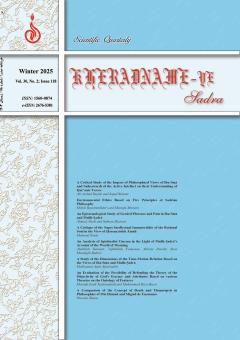A Critical Study of the Impact of Philosophical Views of Ibn Sīnā and Suhrawardī of the Active Intellect on their Understanding of Qur’anic Verses
Subject Areas : Studies on Islamic philosophy and wisdom
Ali Arshad Riyahi
1
![]() ,
Sajad Rahimi
2
,
Sajad Rahimi
2
![]()
1 - Professor at the Islamic Philosophy and Wisdom Department, University of Isfahan, Isfahan, Iran
2 - MA in Islamic Philosophy and Wisdom Department, University of Isfahan, Isfahan, Iran
Keywords: Ibn Sīnā, Suhrawardī, Active Intellect, philosophical interpretation, philosophical esoteric interpretation,
Abstract :
In the philosophies of Ibn Sīnā and Suhrawardī the Active Intellect is the last immaterial existent in the vertical chain of the intellects. The duty of this Intellect is to administer the lower world, create human souls, grant intelligibles to human beings, and, teach and issue the divine orders to the prophets. Ibn Sīnā and Suhrawardī, as two distinguished philosophers of the Peripatetic and Illuminationist Schools, respectively, have discussed this Being and His Attributes in their various works based on their own philosophical ideas. The views of these two philosophers regarding the Active Intellect have greatly influenced their understanding of Qur’anic verses and resulted in their presentation of philosophical or, in some cases, esoteric interpretations. This paper provides a critical analysis of the impact of the philosophical views of Ibn Sīnā and Suhrawardī of the Active Intellect on their understanding of the verses of the Qur’an. To accomplish this task, after examining all of their works, the authors have extracted the Qur’anic perceptions of these two philosophers, which have been influenced by their views of the Active Intellect, and explained the quality of their proofs. Next, they have critically examined the mentioned extractions based on their lexical meanings, science of interpretation, and the related philosophical views and traditional sciences comprehensively and concluded that most of their impressions are unacceptable.
ابنبایویه، محمدبن علی(1361) معانی الاخبار، قم: دفتر انتشارات اسلامی.
ابنسینا (1352) معراجنامه، بهاهتمام بهمن کریمی، رشت: مطبعه عروة الوثقی.
ابنسینا (۱۳۶۳) المبدأ و المعاد، تصحیح عبدالله نورانی، تهران: مؤسسة مطالعات اسلامی دانشگاه مکگیل.
ابنشهرآشوب (بیتا) المناقب، تصحیح محمدحسین آشتیانی و هاشم رسولی، قم.
ابنعربی (1422ق) تفسیر ابن عربی (تأویلات عبد الرزاق)، بیروت: دار إحیاء التراث العربی.
ازهری، محمدبن احمد (1421ق) تهذیب اللغة، تصحیح فاطمه اصلان، محمد اصلان، فاطمه محمد عمر سلامی و عبد الکریم حامد، بیروت: دار إحیاء التراث العربی.
بهمنیار، ابن مرزبان (۱۳۷۵) التحصیل، تهران: دانشگاه تهران.
جوادی آملی، عبدالله (1394) تفسیر تسنیم، قم: اسرا.
راغب اصفهانی، حسینبن محمد (1374) مفردات الفاظ قرآن، ترجمة غلامرضا خسروی حسینی، تهران: مرتضوی.
سهروردی، شهابالدین یحیی (1372) مجموعه مصنفات شیخ¬اشراق، تصحیح سید حسین نصر، هانری کربن و نجفقلی حبیی، تهران: موسسه مطالعات و تحقیقات فرهنگی.
سیوطی، جلالالدین (1394ق) الإتقان فی علوم القرآن، تصحیح محمد ابوالفضل ابراهیم، قاهره: الهیئة المصریة العامة للكتاب.
طباطبائی، سیدمحمدحسین (1352ق) المیزان فی تفسیر القرآن، بیروت: مؤسسة الاعلمی للمطبوعات.
طوسى، محمدبن حسن (بی تا) التبیان فی تفسیر القرآن، تصحیح احمد حبیب عاملى، بیروت: دار إحیاء التراث العربی.
طیب، عبدالحسین (1369) أطیب البیان فی تفسیر القرآن، تهران.
مجلسی، محمدباقر (1403ق) بحار الأنوار لِدُرَرِ أخبارِ الأئمةِ الأطهار، بیروت: دار إحیاء التراث العربی.
مکارم شیرازی، ناصر (۱۳۷۴) تفسیر نمونه، تهران: دار الکتب الإسلامیه.


